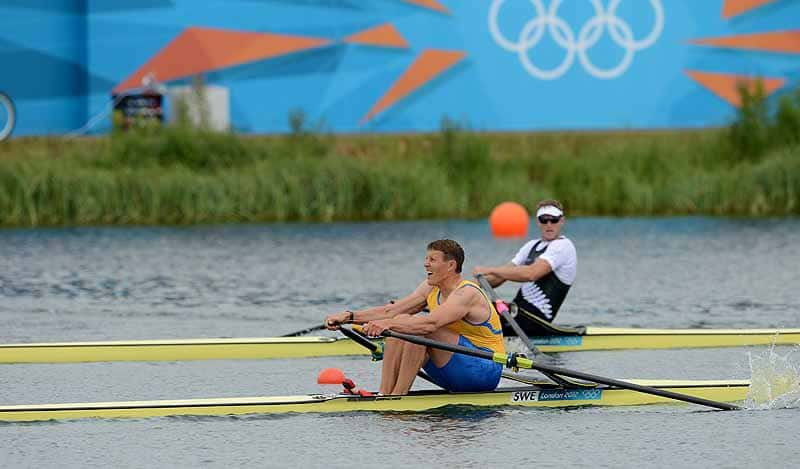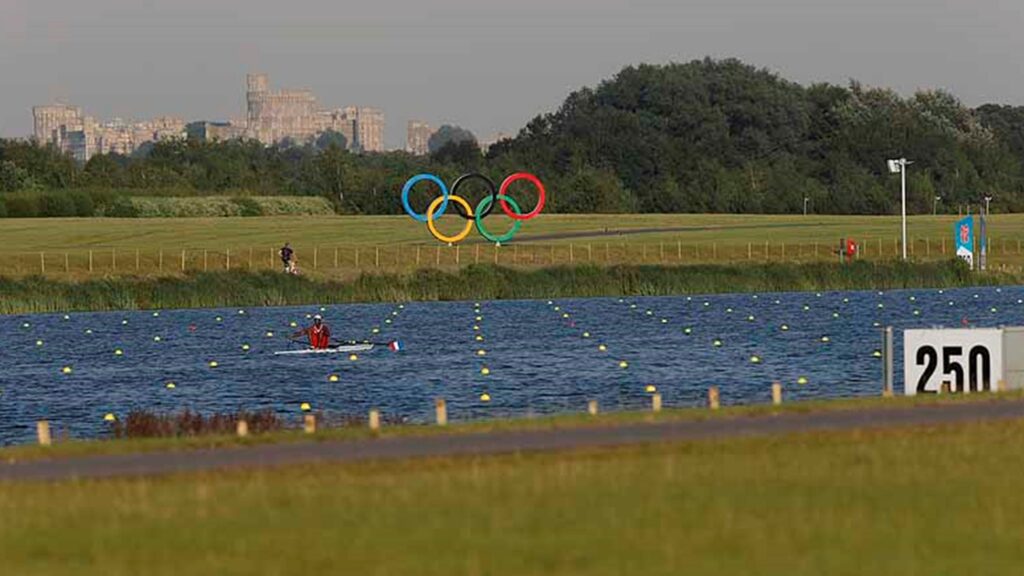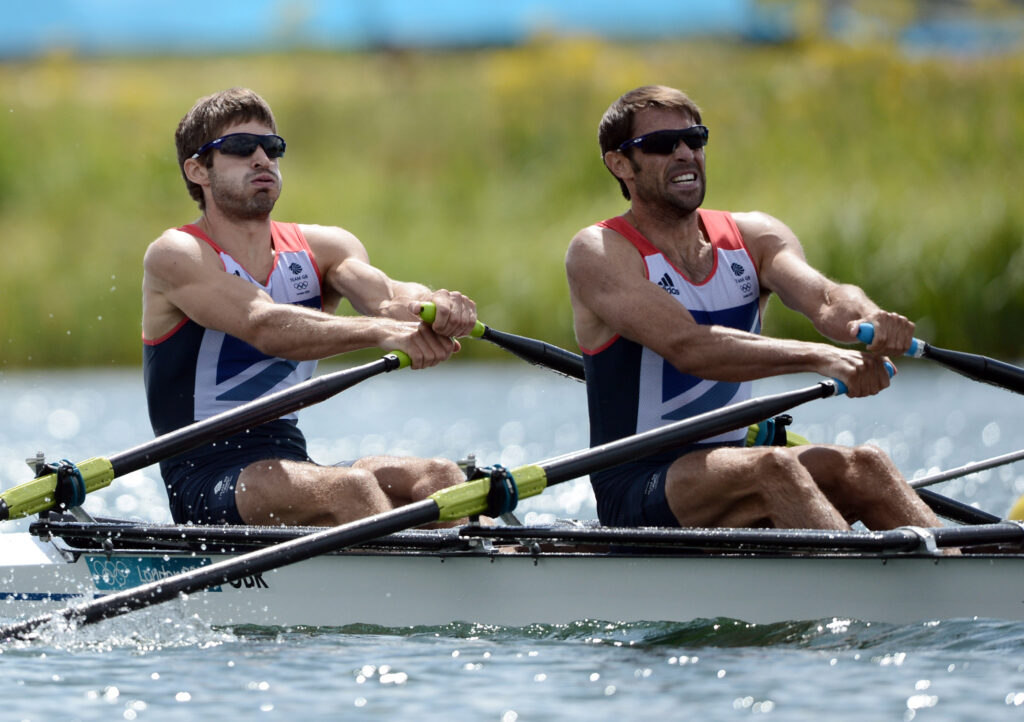
11 Jul 2024
Olympic Rewind - London 2012: Rowing in the Dorney Roar
The London 2012 Olympic Games regatta took place at Eton Dorney, close to Windsor. The lake was constructed by Eton College – long a rowing powerhouse of British schools – to give its boys a safe and consistent place to train. Construction began in 1996 and took a decade to complete, but the first major international regatta held there was World Rowing Cup I in 2005, with the 2006 World Rowing Championships following the next year as the final test event before London was awarded the Olympic Games.
It was a superb regatta for the hosts; Great Britain topped the medals table with four gold medals, two silvers and three bronzes. New Zealand were second, winning three gold and two bronze medals. A total of 18 nations reached the podium, and eight won at least one gold.
In total, 550 athletes from 58 nations competed in London.
Redgrave lights the flame
Rowing was in the spotlight before the first stroke was even taken at the regatta, thanks to Great Britain’s greatest-ever rower, Steve Redgrave.
Redgrave had retired after the Sydney 2000 Olympic Games and his fifth gold medal, but unusually for a rower remained well-known by the public. He was therefore an obvious choice as one of the key torchbearers in the opening ceremony for London 2012, picking up the baton from footballer David Beckham and bringing the torch into the stadium, where he passed it to seven young athletes including rower Cameron MacRitchie.

British summertime and the Dorney Roar
In the run-up to the London 2012 Olympic Games, the heavens opened. Britain was lashed by rain and the site at Dorney became a mudbath, complicating the final build of the temporary grandstands. But then the sun came out, and temperatures rose.
The prevailing wind at Dorney tends to be across the course, but the training days ahead of the Olympics were flat calm and the first day of competition produced a scorching tailwind. In their heat, New Zealanders Eric Murray and Hamish Bond set a world best time in the men’s pair of 6:08.50 which still stands today.
By the later days of the regatta, the wind was very much cross again, and the finals were redrawn to give the fastest crews the shelter of the outside lane.
But the design of the lake, with grandstands on both sides and plenty of spectator space on the grassy areas in the middle of the course, meant that whatever the weather was doing there were thousands of fans packing out the venue. In the last 500m, especially when any British crews were racing, the noise was deafening and arguably unlike anything experienced at an Olympic rowing venue before or since.
“We won the Olympics”
London 2012 was a historic regatta for Great Britain. Not only did they top the rowing medal table for a second Olympic Games running, but the hosts also won not just their first-ever women’s gold medal in Olympic rowing, but three.
The first came in the very first A-final, as Heather Stanning and Helen Glover swept to an early lead and then held off the charging race for silver behind them. Their women’s pair title was the first gold medal for the hosts across the whole Olympic Games, as well as making history for British women’s rowing.
On day 3 of the finals, Katherine Grainger and Anna Watkins won the women’s double sculls – Grainger’s first gold after three Olympic silver medals. And then on day 4, Katherine Copeland and Sophie Hosking were the surprise lightweight women’s double sculls winners. As Hosking turned around to hug her crewmate, Copeland was caught on camera exclaiming “we won the Olympics!”
The hosts also triumphed in the men’s four for a fourth consecutive Olympic Games, with stern pair Andrew Triggs-Hodge and Pete Reed winning their second gold medals.

Men’s sculling drama
The men’s sculling events produced some of the most dramatic moments of the regatta. In the men’s double sculls final, New Zealand’s world champions, Nathan Cohen and Joseph Sullivan, were well off the pace in the early stages of the race as the veteran Slovenian duo of Itzok Cop and Luka Spik led out. Cohen and Sullivan were still out of medal contention with 500m to go, but then they sprinted. With less than 250m to go, the Kiwis tore through Slovenia and then Italy to win. Italy’s Alessio Sartori and Romano Battisti did not seem too disappointed with their silver.
The lightweight men’s double sculls final was also thrilling. Inside the opening strokes, Britain’s Zac Purchase came off his seat and the race was stopped, with Purchase waving his seat to the umpires to prove that he had had a breakage. When the race was restarted, Purchase and Mark Hunter got off to the best start, but Mads Rasmussen and Rasmus Quist of Denmark had more in the closing stages and denied the Britons a second Olympic title.
Mahé Drysdale, after a disappointing Beijing 2008 Olympic Games, brought home gold in the men’s single sculls – with Britain’s Alan Campbell prostrate on the pontoon after holding off Sweden’s Lassi Karonen for bronze.
Not all about winning
Among the nations competing at the regatta was Niger. The African nation had been handed a wild card entry in the men’s single sculls, and Niger chose former swimmer Hamadou Djibo Issaka as their sculler.
Issaka learned to row in a wooden fishing boat only months before the Olympic Games, and only got in a fine racing boat when he arrived in the UK. Unsurprisingly, he was well off the pace, finishing a minute behind the next-slowest sculler in his heat. But the crowds loved him, cheering him on wildly in every round.
And Issaka returned the love. He was often the only sculler who would land at the mixed zone pontoon immediately after his race to speak to journalists, and he never got tired of telling his story. Sometimes, it’s not about winning races that matters.

